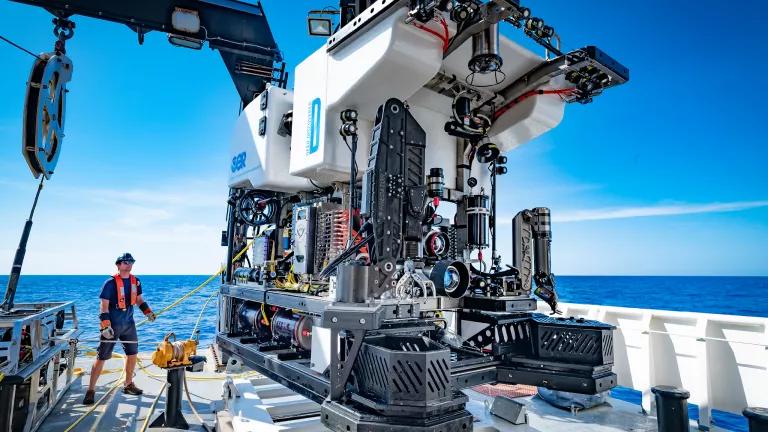Polling Shows Strong Support for Blake Plateau Conservation
Recent polling in Georgia and coastal South Carolina reveals overwhelming support for action to protect key areas on the Blake Plateau.

More than 80% of likely voters in Georgia and coastal South Carolina support deep-sea coral protection, with almost half reporting more favorable views of a President who acts to protect areas on the Blake Plateau. Key reasons to protect the Blake Plateau: its endangered species and habitat protections, and its legacy as a cultural landmark.
NOAA
Roughly 80-200 miles offshore the Carolinas, Georgia, and Florida lies a remarkable hotspot of ocean biodiversity and an important cultural landmark—the Blake Plateau. Recently identified as hosting the world’s largest deep-sea coral habitat, the Blake Plateau provides food and shelter for a diverse array of sea turtles, large fish such as marlin, sharks, and swordfish, and elusive seabirds and whales.
Not only is the plateau a treasure-trove of biodiversity, but it has cultural, spiritual, and historical significance as the final leg of the Middle Passage, the seafaring route by which enslaved West and Central Africans were transported to America. Many Gullah/ Geechee have a cultural and spiritual connection to the Blake Plateau as it serves as an ancestral graveyard for enslaved relatives who did not survive its crossing.
We have a unique opportunity to protect this amazing seascape now, before harmful commercial industries take root offshore. The immense diversity of marine life supported by the Blake Plateau—from its fragile and ancient deep-sea corals to the Sargassum seaweed mats that float on the surface—lacks permanent protections. The area only has time-limited protections from offshore oil and gas activities, and no long-term safeguards from damaging industries like deep-sea mining.
Recent polling in Georgia and coastal South Carolina reveals overwhelming support for action to protect key areas on the Blake Plateau. In fact:
- More than 80% of likely voters in Georgia and coastal South Carolina support deep-sea coral reef protection. Support for deep-sea coral protections is found across the political spectrum—Democrats (86%), Republicans (82%), and Independents (85%).
- After learning more about the Blake Plateau’s deep-sea coral areas, respondents indicated similar support, with total support of 83%. Top convincing reasons to protect the Blake Plateau are protecting its endangered species (76%) and preserving the world’s largest deep-sea coral reef habitat (71%). More than three-quarters of Black voters (79%) found the area’s legacy as a cultural landmark, serving as the resting place for Gullah/ Geechee ancestors, a convincing reason to support protection.
- Almost half of poll respondents would have more favorable views of a President who protected deep-sea coral areas on the Blake Plateau (46% More favorable; 4% Less favorable; 46% No difference).
Currently, the Southeast is among the U.S. regions with the fewest marine protections—less than 1 percent of its waters are strongly protected. The Blake Plateau is still largely pristine, but without durable conservation measures to prohibit commercial extractive activities it could be quickly devastated by rapid ocean industrialization. Deep-sea corals grow just millimeters a year and are highly vulnerable to disturbance; coral formations on the Blake Plateau took hundreds of thousands of years to form and if harmed would not return in any meaningful period of time. The Blake Plateau currently has no lasting protections from commercial extractive industries.
A coalition of environmental and community organizations is seeking to safeguard key ecological features in the heart of the plateau offshore South Carolina and Georgia from extractive activities to secure the area’s health for this and future generations.
Please join us in encouraging the Biden administration safeguard this important and sacred Southern seascape by permanently protecting key features on the Blake Plateau from industrial activity—take action here.



